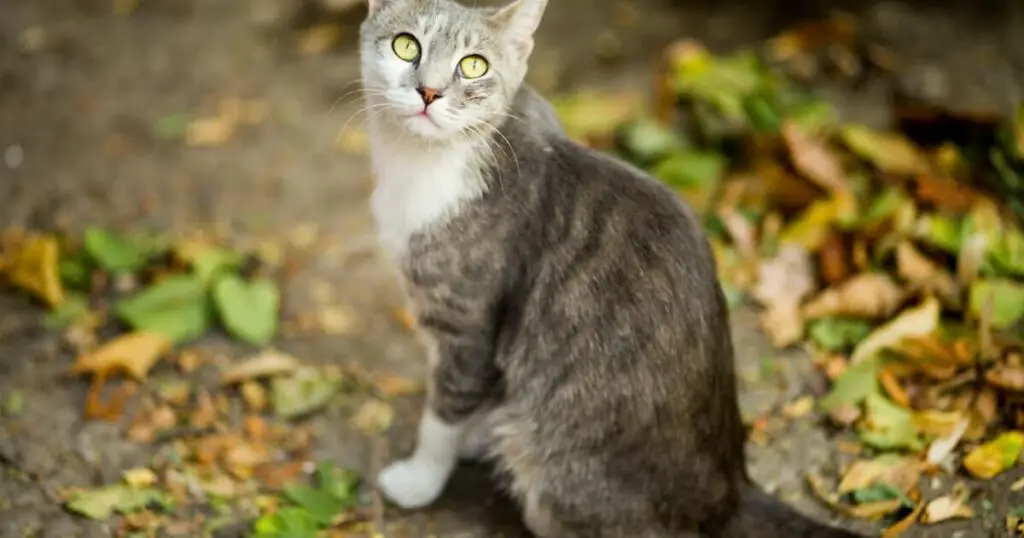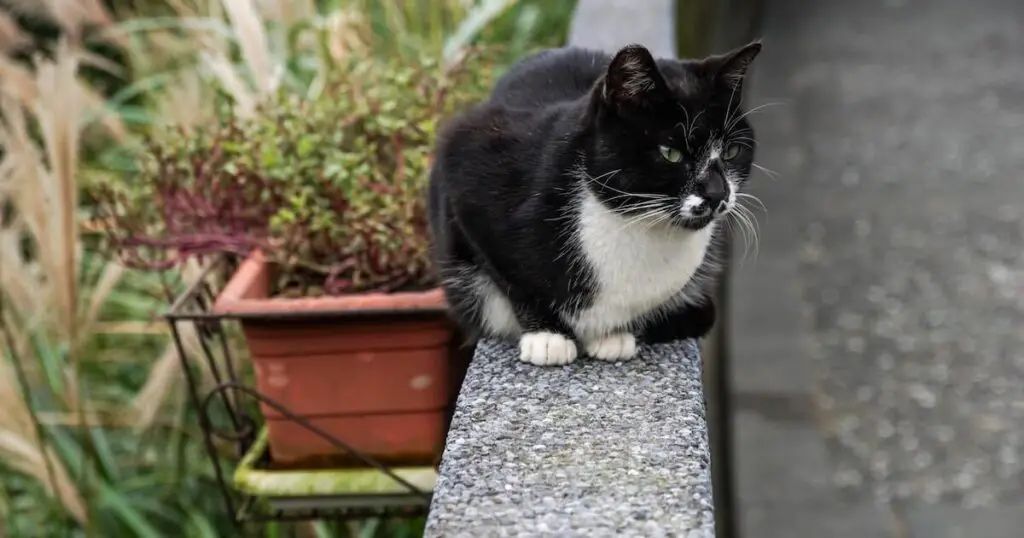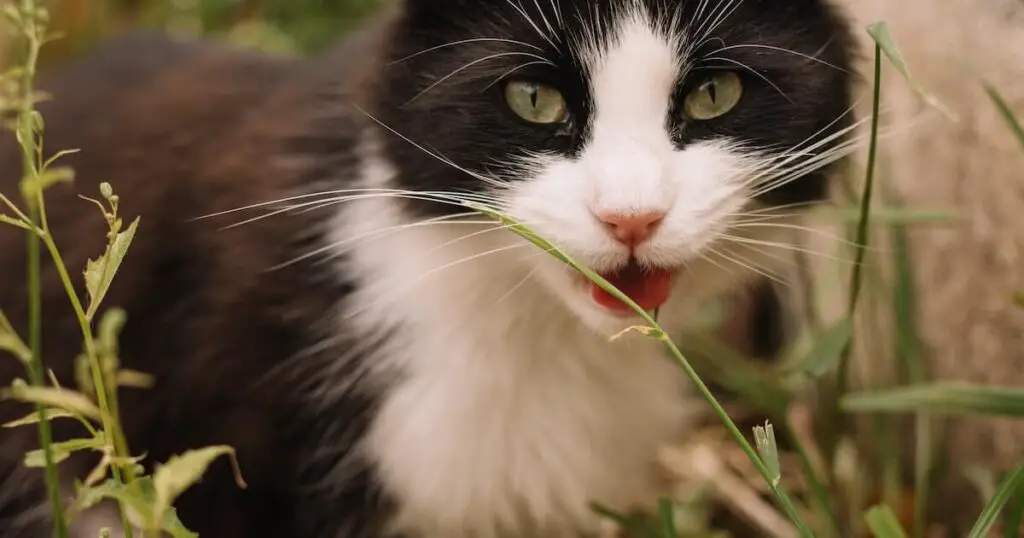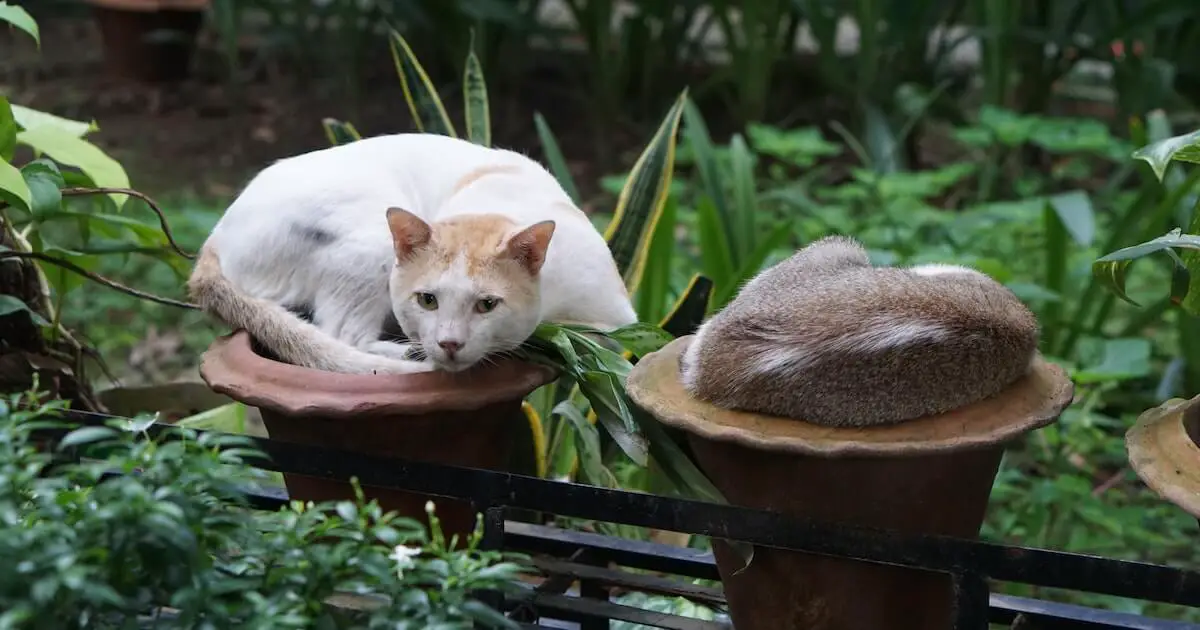Having a peaceful and well-maintained garden is a source of pride for many homeowners. However, the frustration of discovering a neighbour’s cat using your garden as its personal litter box can quickly dampen your gardening enthusiasm. Maybe you are at your wit’s end and wondering what is the UK law if my neighbour’s cat is pooing in my garden.
Sadly no law protects homeowners when it comes to cats pooping in their gardens. Cats have the ‘right to roam’ so your best option is to deter the cats from your garden.
I have personally dealt with this issue as there are at least 4 cats down my road who like to use my garden as a litter tray. I have to admit that it’s frustrating that when I am picking up my dog’s poo, I also have to pick up cat poo at the same time.
In this blog post, I will explore the legal aspects and rights associated with the issue of neighbours’ cats pooping in your garden, specifically focusing on UK law.
Understanding the Legal Framework (or Lack of)
As cats enjoy the ‘right to roam‘, meaning that cats can’t technically ‘trespass’ anywhere, they are footloose and free. Therefore, your neighbour can’t be penalised for their cat going into your garden and pooping.
Your neighbour does not have to prevent their cats from entering your garden, as it would be nearly impossible for them to do so.
Cats are protected animals under the Animal Welfare Act 2006, so you can’t do anything to harm a cat when trying to deter them. Cats are classified as property and so if you harm or steal a cat the Criminal Damages Act 1971 or the Theft Act 1968 come into play.
If you are wondering if you can throw your neighbour’s cat poo back, then I have a separate blog that deals with that query. You can read it here.
If The Issue Is Severe
If the issue is severe, under the Environmental Protection Act 1990, local authorities have the authority to take action if an individual keeps an animal in a way that poses a health threat or causes inconvenience to others.
The environmental health department can investigate complaints related to the nuisance caused by animals and, if necessary, take appropriate action. However, in the case of a cat pooping in your garden, the amount of faeces would need to be significant to qualify as a nuisance under the law.
For example, if your neighbour has 25 cats who are pooping in your garden then this may be enough for the council to investigate the issue. If it is just one or two cats, then it is very unlikely that the council will be able to do anything.
If the issue is severe you should start collecting evidence to show to the council. It is crucial to gather evidence documenting the cat’s repeated intrusion and the resulting damage.
This evidence may include photographs and videos that substantiate your claims.
Detailed records of dates, times, and any previous attempts to address the issue will strengthen your case.
If you feel that your situation is severe then I would recommend contacting the environmental health department to get further advice.

Implementing Cat Deterrents To Stop Cats Pooping In Your Garden
As the law is against you when it comes to your neighbour’s cat pooping in your garden in the UK, your main focus should be on deterring the cats, rather than dealing with your neighbours.
When faced with the problem of a neighbour’s cat pooping in your garden, implementing cat deterrents can be an effective and humane way to discourage the cat from entering your property.
Here are some practical strategies and deterrent options to consider:
1 – Scent-Based Deterrents
Citrus: Cats are known to dislike the smell of citrus fruits. Placing citrus peels or using citrus-scented sprays in your garden can help deter cats.
Strong-smelling plants: Certain plants like lavender, rue, and rosemary have scents that cats find unpleasant.
Incorporating these plants into your garden can act as a natural deterrent.
2 – Physical Barriers
Fencing: Installing a suitable fence around your garden can help keep cats out.
Ensure that the fence is tall enough and has no gaps or footholds that cats can use to access your garden.
Spiky surfaces: Placing plastic or rubber prickle strips on the ground, particularly in areas where cats typically enter, can make it uncomfortable for them to walk or dig.
You shouldn’t use any deterrent that will harm a cat but plastic or rubber spikes are fine.
3 – Ultrasonic Devices
Ultrasonic devices emit high-frequency sounds that are inaudible to humans but can be unpleasant for cats.
These devices are motion-activated and can deter cats from entering your garden.
The Pestbye Cat Deterrent is a great affordable option.
4 – Water Sprinklers
Motion-activated water sprinklers, such as the Hoont Cobra Deer Repellent can startle cats and discourage them from entering your garden.
The sudden burst of water acts as a deterrent without causing harm to the cat.
5 – Outdoor Cat Repellents
Commercially available cat repellents are specifically formulated to deter cats.
‘Get off my garden‘ has a very good reputation.
These repellents typically use natural ingredients, such as plant extracts, to create scents that cats find unpleasant.
6 – Garden Maintenance
Keeping your garden well-maintained can make it less attractive to cats.
Regularly remove fallen leaves, mulch, or other potential hiding places where cats may be inclined to settle.
7 – Secure Wheelie Bins
Ensure that your wheelie bins have tight-fitting lids to prevent cats from accessing them.
If you often find your neighbour’s cats around your bins, then you could consider getting a wheelie bin lock.
Eliminating potential food sources can discourage cats from visiting your garden.
8 – Noise-Making Devices
Cats can be deterred by sudden loud noises. You can use noise-making devices, such as motion-activated alarms or wind chimes, to startle cats and make them wary of entering your garden.
It is important to remember that while these deterrents can be effective in many cases, they may not work for all cats.
Cats can be persistent and adaptable, so it may be necessary to use a combination of deterrent methods or switch strategies periodically to maintain their effectiveness.
Additionally, always prioritise the safety and well-being of cats when implementing deterrents. Avoid using any harmful or inhumane methods that may cause distress or harm to the animals.
By implementing cat deterrents, you can create an environment that is less appealing to cats and reduce the likelihood of them using your garden as a litter box.
Remember to monitor the effectiveness of the deterrents and remain open to exploring other solutions if necessary.
The Cats Protection have some further information on deterring cats.

Why Do Cats Poo In Other Peoples’ Gardens?
Cats may choose to poop in other people’s gardens for several reasons, including instinctual behaviours, territorial marking, and environmental factors.
Here are some common reasons why cats may exhibit this behaviour:
- Territorial Marking: Cats are territorial animals, and they may mark their territory by leaving their scent through urine and faeces. By doing so, they communicate their presence and assert ownership over an area. When a cat encounters a garden that is perceived as unclaimed territory, it may be more inclined to leave its faeces behind as a territorial marker.
- Litter Box Preference: Some cats may prefer certain substrates or conditions to go to the toilet. If a cat finds the soil or loose garden mulch similar to the texture of their litter box, they may naturally choose to use the garden as an alternative spot for elimination.
- Accessibility and Privacy: Cats may be attracted to gardens that provide easy access and a sense of privacy. Gardens with open gates or low fences can be more enticing for cats to explore and use as a bathroom.
- Routine and Habit: Cats are creatures of habit, and they may develop a routine of visiting specific gardens for pooping if they find it convenient or comfortable. Once they establish this habit, it can be challenging to break without intervention.
- Absence of Suitable Alternatives: Cats may choose to use other people’s gardens if they do not have access to a suitable litter box or if the litter box is unclean or unsuitable for their preferences.
It is important to note that not all cats will exhibit this behaviour, and the reasons can vary from cat to cat.

Conclusion
Dealing with a neighbour’s cat using your garden as a litter box can be a frustrating experience.
‘Neighbour’s cat pooping in my garden uk law’ is a commonly searched term and so you are not alone with this frustration.
As it’s not illegal for a cat to poop on someone’s lawn, so focus your time on deterring the cats from your garden, as the law is not on your side.
If the issue is severe and you have a huge amount of cats pooping in your garden and it is causing a health and safety concern, then you could consider contacting the council to see if there is anything they can do.





Leave a Reply